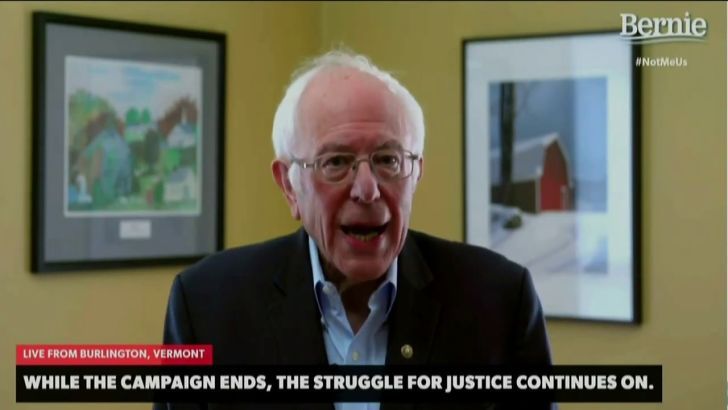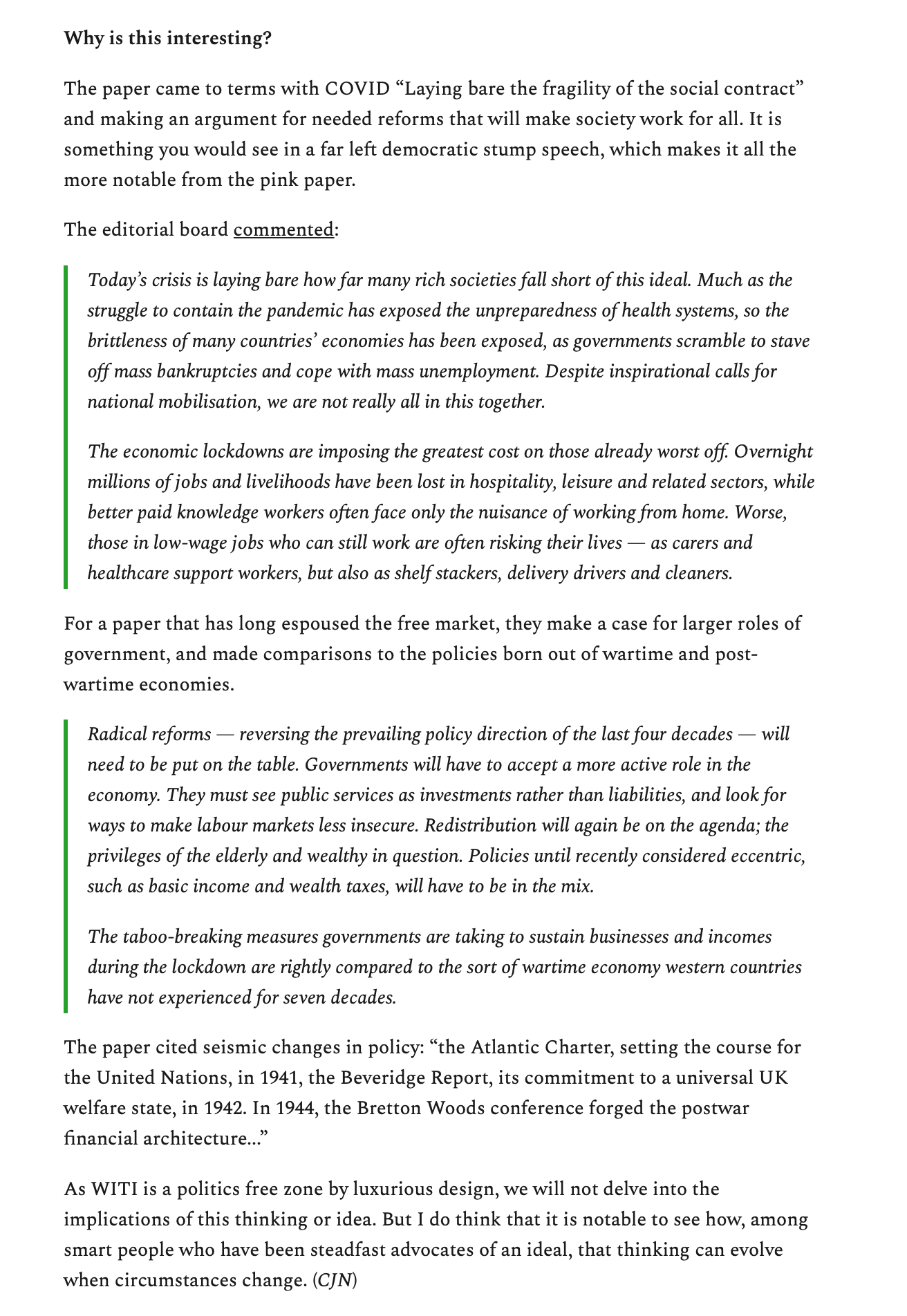Times They Are a-Changing
Today saw Bernie Sanders drop out of the 2020 presidential election. Spurred on by the coronavirus, will his policies gain popularity despite his absence?

Many would be forgiven if they’d forgotten that this is an election year, since it’s become pretty much All COVID-19, All The Time. But this week, in particular, brought the election back into sharp relief. Tuesday saw an Election Day in Wisconsin go forward despite a raging deadly pandemic, after a controversial Supreme Court decision held that there’d be no deadline extension to allow for additional absentee ballots. And today saw the general election matchup become all but a certainty, as Bernie Sanders drops out of the race.
I’m definitely one of those who’s forgotten about the election over the past few weeks, and I’ve found myself thinking of Bernie mostly in hopes that he’s safe and healthy somewhere out of harm’s way amid this pandemic. That’s been about it. But before my coronavirus brain took over, I thought about Bernie quite a bit. I wondered what he must be feeling, thinking, experiencing as he stood behind the podium at one of his jam-packed rallies. Not in the basic sense of wondering what any famous or popular person must feel in front of a jam-packed crowd, because celebrity and fandom are not rarities in this country. But I did wonder about it for Bernie specifically, to hear people yelling and shouting and cheering for him, and more importantly, for his ideas and ideals. Did he feel vindicated? Did he feel latent resentment that if we’d only listened to him 10, 20, 30 years ago, what might the world look like now? Did he grow weary and tired of his own arguments and ever doubt himself? He’s been saying them for so long, and for so long he’s been on the outside looking in. Did he ever succumb to the very human longing for affirmation, after years of not getting it, by simply staying in the race longer than he actually wanted to? Did he return in 2020 because he missed that feeling that had eluded him for his entire political career until four years ago? Probably not, as he seems driven by the same mixture required of all presidential aspirants, of selfless dedication to serving others and that certain strain of narcissism to think he could be the answer to all of our troubles. He still scares many, and that’s not unexpected, as the shift he represents is tectonic, but now, if ever, it feels ever so slightly less tectonic.
I can imagine many out there, Democrats no fewer in number than the Republicans, who are overjoyed by his exit from the race. Those who hate his ideology. Those who hate his rigidity and his constant pivots to the issues he cares most about. Those who hate his style. But I’m thinking mostly about the long arc of his political life, and what an inspiration it should be to young people. A demographic that find itself disillusioned by politics and its processes. A demographic that’s seen gerrymandering used with ruthless efficiency to help further the polarization of our two political parties. A demographic that’s seen systematic attempts (and more than a few startling successes) at voter disenfranchisement. A demographic that sees its future written off as insignificant when it comes to the political response to climate change. For this demographic, the question of “Why bother?” is constantly burning, and many clear-eyed souls would feel justified in saying, “You shouldn’t; it doesn’t matter anyway.” There’s nothing truly comforting to offer this demographic in this time, but there is cause for hope in studying the rise of Bernie Sanders.
In a cruel twist of fate, this should be Bernie’s time to shine. The coronavirus and recession are twin evils of such massive size and scale that they would put his policies in a new light. But he’d lost too much ground before the virus became the crisis we know today, and he’s suffered from the social distancing restrictions, as his campaign was fueled by large rallies and nonstop campaigning. I’d wanted to link to a recent article by Fintan O’Toole in The New York Review of Books, entitled “An Outside Chance,” which was just a masterful piece on Bernie, the man and the ideologue. But the article now resides behind the publication’s paywall. (If you’re in the mood to subscribe to support journalism in this trying time, a local daily is probably the most-needing of your help, but if you’ve got it to spare, it’s an incredible value to get both the print and digital subscription to the New York Review of Books for only $10. Highly recommended for top-notch writing.) So instead I bring you a slightly more timely piece from The New Yorker, making the the point I raised above: This was Bernie’s time to shine, and though it was probably not unexpected, perhaps it’s a shame that the author’s points are now moot.
Keeanga-Yamahtta Taylor writes:
The crisis is laying bare the brutality of an economy organized around production for the sake of profit and not human need. The logic that the free market knows best can be seen in the prioritization of affordability in health care as millions careen toward economic ruin. It is seen in the ways that states have been thrown into frantic competition with one another for personal protective equipment and ventilators—the equipment goes to whichever state can pay the most. It can be seen in the still criminally slow and inefficient and inconsistent testing for the virus. It is found in the multi-billion-dollar bailout of the airline industry, alongside nickel-and-dime means tests to determine which people might be eligible to receive ridiculously inadequate public assistance.
It remains to be seen whether Bernie’s ideas will ever gain a toehold in American society, let alone become the prevailing wisdom or new normal. And, if it does, there’s a real chance that Bernie is a modern-day Moses, relegated to decades of leading his tribe through the wilderness and he himself never gaining entrance to the Promised Land. But while the Promised Land may be far off, seemingly unreachable, I have to imagine that while standing at his podium, looking up into the deepest corners of his thousands-strong crowds, he could, if just barely, glimpse it.
Reality Has Endorsed Bernie Sanders | The New Yorker
I’m not the only one thinking in these terms. One of my absolute favorite fellow Substack publications, Why is this interesting?, a daily newsletter doing just what the title explains – letting you know why something is interesting. It’s decidedly non-political, as the post I’m linking will reaffirm, but it tiptoes up to the very edge of the political when it documents the “sea change” from the editorial board of the Financial Times. The newsletter describes FT like so:
The FT editorial pages typically espouse viewpoints that you’d expect from the global paper of capitalism, the “free markets, free people” line shared by the likes of /The Economist/. Which is why I was very surprised to see an editorial page column take a sharp tack in the other direction.
I’ll just screen-cap the heart of the newsletter here:

It’ll be interesting to see if others, whether individuals or institutions, radically depart from tried and true ways of viewing the world as coronavirus makes the world, in many respects, unrecognizable to us.
Subscribe to Why is this interesting? for more great daily content:
Why is this interesting? | The Sea Change Edition
If you liked what you read, please sign up, follow me on Twitter (@CaryLiljohn06) and then forward to friends to help spread the word.